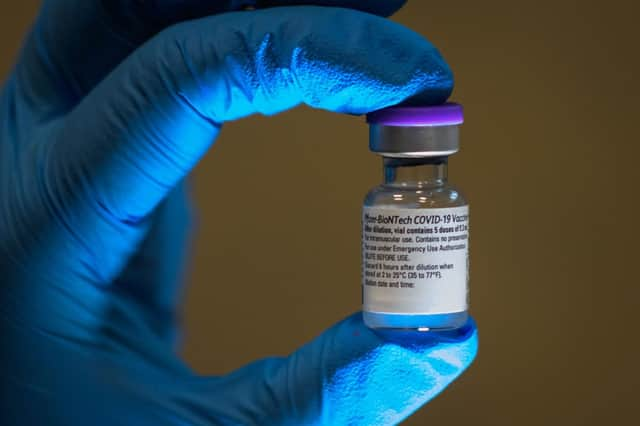Pfizer Covid vaccine is effective against South African variant - how does the Oxford jab compare?


The Pfizer/BioNTech Covid-19 is effective in protecting against the coronavirus variant that emerged from South Africa, a new study has found.
Researchers at the University of Texas Medical Branch (UTMB) at Galveston found that the vaccine neutralises the virus with the N501Y and E484K mutations.
Mutant viruses neutralised
Advertisement
Hide AdAdvertisement
Hide AdThe UTMB study, published in Nature Medicine, tested sera samples obtained from the blood and found evidence that the mutant viruses were neutralised by the Pfizer vaccine.
However, results did find that neutralisation against the E484K mutation was slightly lower than against the N501Y mutation.
New strains of Covid-19 that have been discovered in the UK and South Africa all share the same N501Y mutation, but a separate South African strain has an E484K mutation, with a number of these cases being detected in the UK causing concern.
These mutations are located in the viral spike protein and could potentially increase the affinity of the viral spike for the ACE2 receptor to which Covid-19 is known to bind.
Advertisement
Hide AdAdvertisement
Hide AdResearchers say the N501Y mutation also seems to expand the range of hosts the virus can infect to include mice.
Pei-Yong Shi, from the UTMB, and Philip Dormitzer, vice president and chief scientific officer of viral vaccines at Pfizer, and colleagues engineered combinations of mutations found in these circulating variants, and tested these on 20 participants who were previously part of the vaccine clinical trial.
Samples were obtained two or four weeks after immunisation with two doses of the vaccine, three weeks apart.
Each serum was then tested for neutralisation of the non-mutant strain of coronavirus, as well as the mutant strains.
Advertisement
Hide AdAdvertisement
Hide AdProf Shi said: “In this study, we engineered the common mutation from the new strains – N501Y in the spike protein (the viral protein responsible for attaching to and entering cells) – to SARS-CoV-2.
“As a continuous collaboration with Pfizer, we used a panel of clinical trial serum specimens to test if this single mutation affects the antibody activity against the virus induced by the vaccine.
“Our results showed this mutation alone does not compromise the vaccine’s neutralising activity against the virus, which is good news for the vaccine.”
How does the Oxford vaccine compare?
The UTMB study comes following separate research that found the Oxford/AstraZeneca vaccine was not effective at preventing mild illness caused by the more contagious South African mutation.
Advertisement
Hide AdAdvertisement
Hide AdA study of around 2,000 people has shown that the vaccine only offers minimal protection against mild disease of the variant and, due to the young age of the participants, could not conclude whether the jab can protect against severe disease.
More than 140 cases of the South African variant have so far been identified in the UK, with experts warning these are likely to be the “tip of the iceberg” due to the fact they are the result of random checks on five to 10 per cent of all positive tests.
Dr Mike Tildesley, who advises the government as a member of the Scientific Pandemic Influenza Group on Modelling (Spi-M), said it is “very possible” that the South African variant is already quite widely spread in the UK.
He said that “surge testing” currently taking place must be effective to stop the variant spreading further, and warned that lockdown restrictions may be needed for longer if the mutation does become more prevalent in the UK.
Advertisement
Hide AdAdvertisement
Hide AdOn Monday (8 February), health minister Edward Argar said that Oxford researchers remained confident that their vaccine could prevent severe disease from the variant, and booster jabs to tackle new strains are already in the pipeline.
As such, Britons face needing a third jab this year amid concerns over the Oxford vaccine’s effectiveness against the mutant strain.
Professor Sarah Gilbert, lead research of the Oxford vaccine, said her team is currently working on an adapted version of the jab that could tackle the South African mutation, with hopes the booster vaccine will be available by autumn.
She said: “This year we expect to show that the new version of the vaccine will generate antibodies that recognise the new variant. Then it will be very much like working on flu vaccines.
“It looks very much like it will be available for the autumn.”